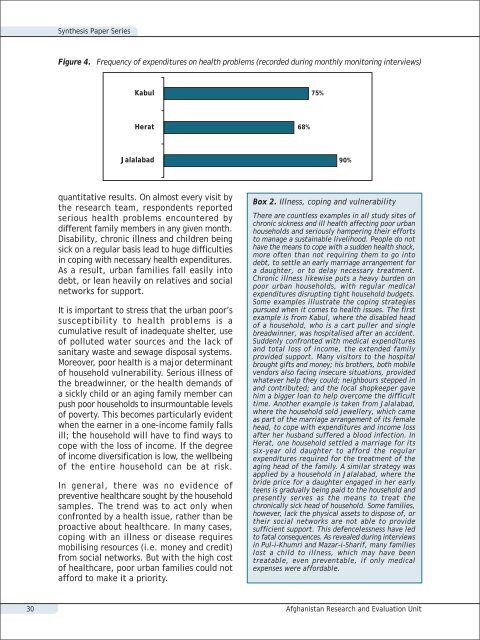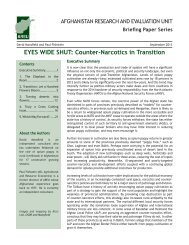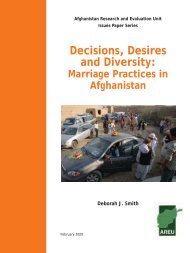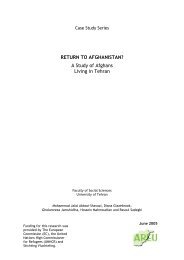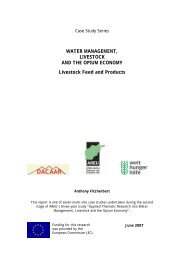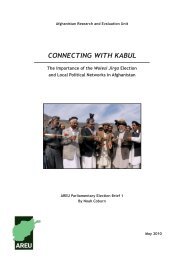Urban Livelihoods in Afghanistan - the Afghanistan Research and ...
Urban Livelihoods in Afghanistan - the Afghanistan Research and ...
Urban Livelihoods in Afghanistan - the Afghanistan Research and ...
You also want an ePaper? Increase the reach of your titles
YUMPU automatically turns print PDFs into web optimized ePapers that Google loves.
Syn<strong>the</strong>sis Paper SeriesFigure 4. Frequency of expenditures on health problems (recorded dur<strong>in</strong>g monthly monitor<strong>in</strong>g <strong>in</strong>terviews)Kabul75%Herat68%Jalalabad 90%quantitative results. On almost every visit by<strong>the</strong> research team, respondents reportedserious health problems encountered bydifferent family members <strong>in</strong> any given month.Disability, chronic illness <strong>and</strong> children be<strong>in</strong>gsick on a regular basis lead to huge difficulties<strong>in</strong> cop<strong>in</strong>g with necessary health expenditures.As a result, urban families fall easily <strong>in</strong>todebt, or lean heavily on relatives <strong>and</strong> socialnetworks for support.It is important to stress that <strong>the</strong> urban poor’ssusceptibility to health problems is acumulative result of <strong>in</strong>adequate shelter, useof polluted water sources <strong>and</strong> <strong>the</strong> lack ofsanitary waste <strong>and</strong> sewage disposal systems.Moreover, poor health is a major determ<strong>in</strong>antof household vulnerability. Serious illness of<strong>the</strong> breadw<strong>in</strong>ner, or <strong>the</strong> health dem<strong>and</strong>s ofa sickly child or an ag<strong>in</strong>g family member canpush poor households to <strong>in</strong>surmountable levelsof poverty. This becomes particularly evidentwhen <strong>the</strong> earner <strong>in</strong> a one-<strong>in</strong>come family fallsill; <strong>the</strong> household will have to f<strong>in</strong>d ways tocope with <strong>the</strong> loss of <strong>in</strong>come. If <strong>the</strong> degreeof <strong>in</strong>come diversification is low, <strong>the</strong> wellbe<strong>in</strong>gof <strong>the</strong> entire household can be at risk.In general, <strong>the</strong>re was no evidence ofpreventive healthcare sought by <strong>the</strong> householdsamples. The trend was to act only whenconfronted by a health issue, ra<strong>the</strong>r than beproactive about healthcare. In many cases,cop<strong>in</strong>g with an illness or disease requiresmobilis<strong>in</strong>g resources (i.e. money <strong>and</strong> credit)from social networks. But with <strong>the</strong> high costof healthcare, poor urban families could notafford to make it a priority.Box 2. Illness, cop<strong>in</strong>g <strong>and</strong> vulnerabilityThere are countless examples <strong>in</strong> all study sites ofchronic sickness <strong>and</strong> ill health affect<strong>in</strong>g poor urbanhouseholds <strong>and</strong> seriously hamper<strong>in</strong>g <strong>the</strong>ir effortsto manage a susta<strong>in</strong>able livelihood. People do nothave <strong>the</strong> means to cope with a sudden health shock,more often than not requir<strong>in</strong>g <strong>the</strong>m to go <strong>in</strong>todebt, to settle an early marriage arrangement fora daughter, or to delay necessary treatment.Chronic illness likewise puts a heavy burden onpoor urban households, with regular medicalexpenditures disrupt<strong>in</strong>g tight household budgets.Some examples illustrate <strong>the</strong> cop<strong>in</strong>g strategiespursued when it comes to health issues. The firstexample is from Kabul, where <strong>the</strong> disabled headof a household, who is a cart puller <strong>and</strong> s<strong>in</strong>glebreadw<strong>in</strong>ner, was hospitalised after an accident.Suddenly confronted with medical expenditures<strong>and</strong> total loss of <strong>in</strong>come, <strong>the</strong> extended familyprovided support. Many visitors to <strong>the</strong> hospitalbrought gifts <strong>and</strong> money; his bro<strong>the</strong>rs, both mobilevendors also fac<strong>in</strong>g <strong>in</strong>secure situations, providedwhatever help <strong>the</strong>y could; neighbours stepped <strong>in</strong><strong>and</strong> contributed; <strong>and</strong> <strong>the</strong> local shopkeeper gavehim a bigger loan to help overcome <strong>the</strong> difficulttime. Ano<strong>the</strong>r example is taken from Jalalabad,where <strong>the</strong> household sold jewellery, which cameas part of <strong>the</strong> marriage arrangement of its femalehead, to cope with expenditures <strong>and</strong> <strong>in</strong>come lossafter her husb<strong>and</strong> suffered a blood <strong>in</strong>fection. InHerat, one household settled a marriage for itssix-year old daughter to afford <strong>the</strong> regularexpenditures required for <strong>the</strong> treatment of <strong>the</strong>ag<strong>in</strong>g head of <strong>the</strong> family. A similar strategy wasapplied by a household <strong>in</strong> Jalalabad, where <strong>the</strong>bride price for a daughter engaged <strong>in</strong> her earlyteens is gradually be<strong>in</strong>g paid to <strong>the</strong> household <strong>and</strong>presently serves as <strong>the</strong> means to treat <strong>the</strong>chronically sick head of household. Some families,however, lack <strong>the</strong> physical assets to dispose of, or<strong>the</strong>ir social networks are not able to providesufficient support. This defencelessness have ledto fatal consequences. As revealed dur<strong>in</strong>g <strong>in</strong>terviews<strong>in</strong> Pul-i-Khumri <strong>and</strong> Mazar-i-Sharif, many familieslost a child to illness, which may have beentreatable, even preventable, if only medicalexpenses were affordable.30<strong>Afghanistan</strong> <strong>Research</strong> <strong>and</strong> Evaluation Unit


